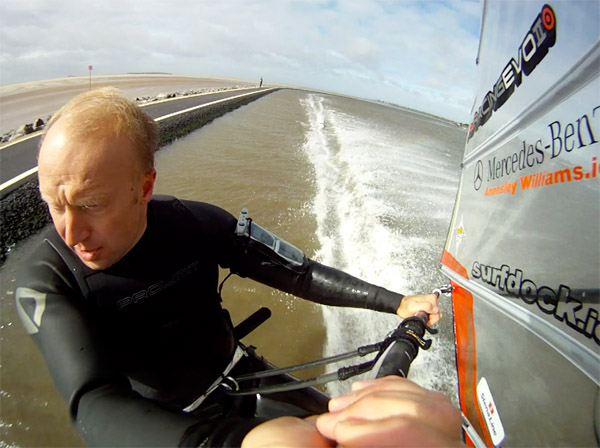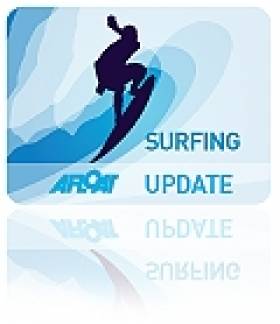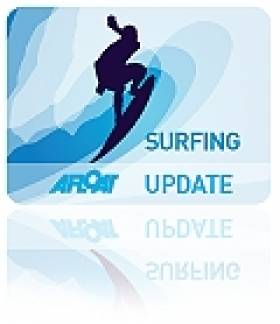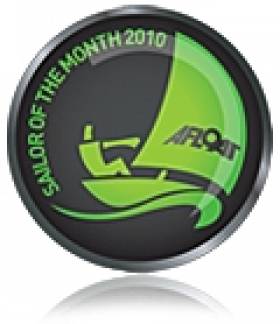Displaying items by tag: Oisin Van Gelderen
Van Gelderen Claims Irish Speed Sailing Title for 2011
#WINDSURFING - Oisín van Gelderen is all but confirmed as Irish Speed Sailing Champion for the second year running.
His national record speed (44.23 knots by 5x10 second average and 43.96 knots over 500m) puts him far ahead of his nearest competition in the rankings.
But his competitive spirit would not let him rest on his laurels.
"Ever since setting that record in February, I have been trying to beat it," he said, "and we had a really good day on Thursday in Dungarvan."
Though he did not beat his averages, he did set a new Irish record for peak speed at 47.89 knots (verification pending).
Van Gelderen dedicated his previous national title win to to the memory of Surfdock founder Alan Harris and Irish 500m speed record holder John Kenny, who both passed away in 2010.
Meanwhile, his Surfdock teammate Noelle Doran has taken the women's title for 2011 with a very impressive set of times for the year.
Her Irish women's peak record of 38.17 knots was complemented by third overall place for 2011 by 5x10 second average and first in the world over 500m.
"I'm so delighted for her," said Van Gelderen. "She had a nasty injury a few years ago, where she dislocated her hip while windsurfing. The resulting nerve damage put a stop to her competing in Waves and Freestyle, where she had multiple national titles."
Van Gelderen Becomes Fastest Sailor on Irish Waters
The Irish GPS Speedsailing record fell again last Friday in Dungarvan when Oisin Van Gelderen broke all previous speeds, becoming the fastest sailor ever to sail on Irish waters.
The speed is ratified by the WGPSSRC (World GPS Speedsailing Records Council):
http://www.gps-speedsurfing.com/default.aspx?mnu=records, who issue GPS records based on the best 10 second run of 45.02 knots, and a distance travelled of around 270 metres in this time.
The 5 x 10second run average, currently puts him in fourth overall on the 2011 GPS speed ranking list and 23rd overall in the all time rankings.
Peak speed for the day was 46.32 knots (84 kmph), and 500m speed was 43.96knots.
Even though Van Gelderen broke the late John Kenny's 500m speed, he retains that title for now, as the WSSRC (World Speed sailing Records Council) issue National records for that distance, and do not yet recognize GPS.
The rise in popularity in GPS speedsailing has made the competition a worldwide phenomenon, as people from different countries compete year round to push their personal and international speeds. Over 4000 members subscribe to the gps-speedsurfing.com website.
Oisín van Gelderen Takes Speed Sailing Title
Oisín van Gelderen has won the Irish Speed Sailing Championship for 2010 after a phenomenal season.
The Afloat.ie/Irish Independent Sailor of the Month for September 2010 had a clean slate of results for the year, posting the fastest speeds over 500m and by 10-second average.
But the highlight of his year was undoubtedly his personal record-breaking speed trials in West Kirby, near Liverpool (SEE VIDEO BELOW) where he reached a maximum speed of 47.17 knots (87.36 kmph).
"I am looking forward to 2011, and hope to improve my speeds, and spend a lot more time back in the waves this year too," he said.
Van Gelderen dedicated his title win to the memory of Surfdock founder Alan Harris and Irish 500m speed record holder John Kenny, who both passed away in 2010.
Sailor of the Month September 2010 - OISIN VAN GELDEREN
Oisin van Gelderen of Skerries is the Afloat.ie/Irish Independent "Sailor of the Month" for September after his sensational windsurfer speed runs on the famous Marine Lake at West Kirby near Liverpool on September 15th. (SCROLL DOWN FOR VIDEO OF THE RECORD RUN)
Zooming along in 30—35 knot breezes, and using the specialised GPS analytical systems which have been developed for this extremely advanced form of sailing, van Gelderen (40) recorded a fastest speed burst of 47.17 knots. And although his average from his five best runs was down at 43.19 knots, it is still a new Irish record.
It is almost impossible for anyone outside windsurfing to imagine what it's like to experience these speeds on a board. The current unlimited world speed sailing record is 51.36 knots, established a year ago by Alain Thebault and his crew on the 60ft French trimaran Hydroptere, which skims across the water on hydrofoils once a basic speed (quite high in itself) is achieved.
Because of the hydrofoils, all hulls of the boat are clear of the water. And although the spray can fly across like a fusillade of bullets, you are travelling in luxury by comparison with a lone windsurfer battling the elements.
Going hyper-fast, water doesn't seem like water any more. It's more like concrete. Yet this kind of speed provides heaps of adrenalin, and then some. The sailing was so good that Van Gelderen would have kept going on into the night, but the danger of crashing into the West Kirby walls in the dark was very real.
While the Hydroptere speeds were the result of crew and technical team joint efforts, although Oisin van Gelderen was using the best of windsurfer technology, there is an intensely personal element in his feat which no other form of sailing can match, and we salute his achievement.
Dublin Windsurfer Claims Irish Speed Sailing Record
"I know for sure my Max Speed of 47.17 knots is the fastest any Irish sailor has ever done" he claims.
The current record, approved by the World Speed Sailing Council, was set by John Kenny in February who achieved a personal best of a burst of 45.3 knots (it's 84 kph) and averaged 42.52 for the 500 metres.
Van Gelderen describes the build up to yesterday's record attempt at the UK's West Kirby venue:
"The wind was pretty strong - 30-40 knots, so I rigged my brand new Pryde 4.7m RSRacing - just to get the hang things. As it turned out, this sail was perfect for me all day (I'm not the heaviest speed-sailor at 78 kgs).
I knew my board was already fast, but I'm also delighted with the sail, which was rigged for the first time and performed straight away without any tuning.
Van Gelderen's record breaking tracks are HERE

Oisin Van Gelderen concentrates on a speed sailing record run in West Kirby yesterday, its famous wall in the background


































































